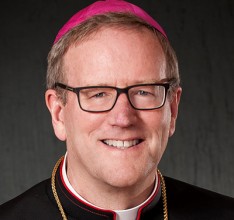US Bishop addresses thousands of Facebook staff on how to have a good religious argument online

A US Catholic bishop addressed Facebook employees this week on the subject of 'How to have a religious argument' online, urging users to seek 'with great patience to understand your opponent's position'.
The Los Angeles Auxiliary Bishop Robert Barron, whose Word of Fire website reaches millions of people over the internet each year, was speaking at Facebook's California headquarters on Monday. The event was live-streamed to around 2,500 viewers.
According to the Catholic News Agency, he said that while it can be 'very tempting just to fire back "why you're wrong"' users should instead highlight what their opponents in debate have got right.
This, said the bishop, is an 'extraordinarily helpful' way to get past impasses in arguments.
'If we don't know how to argue about religion, then we're going to fight about religion,' he said.
Indeed, Bishop Barron said that argument is something positive and 'a way to peace'.
Addressing the Facebook employees about their work, he said that their company shows an 'extraordinary spiritual power' in connecting all the world. 'I think that it's a spiritual thing that you're bringing everybody together,' he said.
However, he said that there is often more heat than light on social media, where 'you'll see a lot of energy around religious issues. There will be a lot of words exchanged, often angry ones, but very little argument.'
Barron addressed several other mindsets that he said forestall intelligent argument about religion.
The mentality of 'mere toleration' keeps religion to oneself and treats it as a hobby. But religion makes truth claims, like claims that Christ rose from the dead.

'Truth claims, if they really are truth claims, cannot be privatised. A truth claim always has a universal scope, a universal intent,' he said.
'The privatisation of religion is precisely what makes real argument about religion impossible.'
Barron went on to say that while science has created great knowledge that should be embraced, there is the mindset of 'scientism' which reduces all knowledge to scientific form.
'It results in a deep compromise of our humanity, it seems to me,' he said, furthering the argument that religious truths are more akin to those of literature, poetry and philosophy. The scientistic mindset, he said, would have to argue that Shakespeare's plays or Plato's philosophical dialogues do not convey deep truths about life, death, faith, and God.
Scientism also mistakes its subject when attempting to consider God, Barron said. 'The one thing God is not is an item within the universe,' he added.











